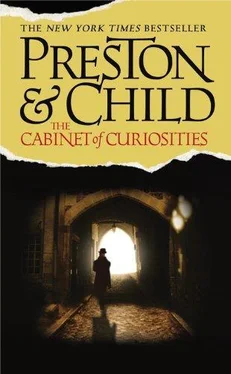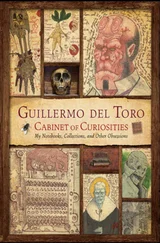Douglas Preston - The Cabinet of Curiosities
Здесь есть возможность читать онлайн «Douglas Preston - The Cabinet of Curiosities» весь текст электронной книги совершенно бесплатно (целиком полную версию без сокращений). В некоторых случаях можно слушать аудио, скачать через торрент в формате fb2 и присутствует краткое содержание. Жанр: Триллер, на английском языке. Описание произведения, (предисловие) а так же отзывы посетителей доступны на портале библиотеки ЛибКат.
- Название:The Cabinet of Curiosities
- Автор:
- Жанр:
- Год:неизвестен
- ISBN:нет данных
- Рейтинг книги:3 / 5. Голосов: 1
-
Избранное:Добавить в избранное
- Отзывы:
-
Ваша оценка:
- 60
- 1
- 2
- 3
- 4
- 5
The Cabinet of Curiosities: краткое содержание, описание и аннотация
Предлагаем к чтению аннотацию, описание, краткое содержание или предисловие (зависит от того, что написал сам автор книги «The Cabinet of Curiosities»). Если вы не нашли необходимую информацию о книге — напишите в комментариях, мы постараемся отыскать её.
The Cabinet of Curiosities — читать онлайн бесплатно полную книгу (весь текст) целиком
Ниже представлен текст книги, разбитый по страницам. Система сохранения места последней прочитанной страницы, позволяет с удобством читать онлайн бесплатно книгу «The Cabinet of Curiosities», без необходимости каждый раз заново искать на чём Вы остановились. Поставьте закладку, и сможете в любой момент перейти на страницу, на которой закончили чтение.
Интервал:
Закладка:
Pendergast closed his eyes. He imagined a chessboard inside his head, on a wooden table, standing in a pool of yellow light. Then he created two players. The first player made his opening move; the second followed. A game of speed chess ensued; and then another, and another. The two players changed strategies, forming adaptive counterattacks: Inverted Hanham, Two Knights Defense, Vienna Gambit.
One by one, the more distant noises dropped away.
When the final game ended in a draw, Pendergast dissolved the chess set. Then, in the darkness of his mind’s eye, he created four players, seated around a card table. Pendergast had always found bridge a nobler and subtler game than chess, but he rarely played it with others because, outside of his late family, he had found few worthy partners. Now the game began, each player ignorant of all but his own thirteen cards, each player with his own strategies and intellectual capabilities. The game began, with ruffs and slams and deep finesses. Pendergast toyed with the players, shifting Blackwood, Gerber, and Stayman conventions, positing a forgetful declarer, misunderstood signals between East and West.
By the time the first rubber was completed, all distractions were gone. The noises had ceased. In his mind, only a profound silence reigned. Pendergast turned further inward.
It was time for the memory crossing to begin.
Several minutes of intense mental concentration passed. Finally, he felt ready.
In his mind’s eye, he rose from his bed. He felt light, airy, like a ghost. He saw himself walk through the empty hospital corridors, down the stairwell, across the arched foyer, and out onto the wide front steps of the hospital.
Only the building was no longer a hospital. A hundred and twenty years before, it had been known as the New York Rest Home for Consumptives.
Pendergast stood on the steps for a moment, glancing around in the gathering dusk. To the west, toward Central Park, the Upper East Side had become a patchwork of hog farms, wild lands, and rocky eminences. Small groups of hovels sprouted up here and there, huddled together as if for protection against the elements. Gas lamps stood along the avenue, infrequent this far north of the populous downtown, throwing small circles of light down onto the dusky macadam.
The prospect was vague, indistinct: detail at this location was unimportant. Pendergast did, however, allow himself to sample the air. It smelled strongly of coal smoke, damp earth, and horse manure.
He descended the steps, turning onto Seventy-sixth Street and walking east toward the river. Here it was more thickly settled, newer brownstones abutting old wood-and-frame structures. Carriages swayed down the straw-strewn street. People passed him silently, the men dressed in long suits with thin lapels, women in bustles and veiled hats.
At the next intersection he boarded a streetcar, paying five cents for the ride down to Forty-second Street. There, he transferred to the Bowery & Third Avenue elevated railway, paying another twenty cents. This extravagant price ensured him a palace car, with curtained windows and plush seats. The steam locomotive heading the train was named the Chauncey M. Depew. As it hurtled southward, Pendergast sat without moving in his velveteen chair. Slowly, he allowed sound to intrude once more into his world: first the clatter of the wheels on the tracks, and then the chatter of his passengers. They were engrossed with the concerns of 1881: the president’s recovery and the imminent removal of the pistol ball; the Columbia Yacht Club sailing regatta on the Hudson earlier that afternoon; the miraculous curative properties of the Wilsonia Magnetic Garment.
There were still gaps, of course — hazy dark patches, like fog — about which Pendergast had little or no information. No memory crossing was ever complete. There were details of history that had been irrevocably lost.
When the train at last reached the lower stretches of the Bowery, Pendergast disembarked. He stood on the platform a moment, looking around a little more intently now. The elevated tracks were erected over the sidewalks, rather than along the middle of the street, and the awnings below were covered in a greasy film of oil drippings and ash. The Chauncey M. Depew gave a shriek, beginning its furious dash to the next stop. Smoke and hot cinders belched from its stack, scattering into the leaden air.
He descended skeletal wooden stairs to ground level, alighting outside a small shop. He glanced at its signboard: George Washington Abacus, Physiognomic Operator and Professor of the Tonsorial Art. The broad thoroughfare before him was a sea of bobbing plug hats. Trams and horsecars went careering down the center of the road. Peddlers of all kinds jostled the narrow sidewalk, crying out their trade to all who would listen. “Pots and pans!” called a tinker. “Mend your pots and pans!” A young woman trundling a steaming cauldron on wheels cried, “Oysters! Here’s your brave, good oysters!” At Pendergast’s left elbow, a man selling hot corn out of a baby’s perambulator fished out an ear, smeared it with a butter-soaked rag, and held it out invitingly. Pendergast shook his head and eased his way into the milling crowd. He was jostled; there was a momentary fog, a loss of concentration; and then Pendergast recovered. The scene returned.
He moved south, gradually bringing all five senses fully alive to the surroundings. The noise was almost overwhelming: clattering horseshoes, countless snatches of music and song, yelling, screaming, whinnying, cursing. The air was supercharged with the odors of sweat, dung, cheap perfume, and roasting meats.
Down the street, at 43 Bowery, Buffalo Bill was playing in the Scout of the Plains stage show at the Windsor. Several other theaters followed, huge signs advertising current performances: Fedora, Peck’s Bad Boy, The Darkness to the North, Kit, the Arkansas Traveler. A blind Civil War veteran lay between two entrances, cap held out imploringly.
Pendergast glided past with barely a glance.
At a corner, he paused to get his bearings, then turned onto East Broadway Street. After the frenzy of Bowery, he entered a more silent world. He moved past the myriad shops of the old city, shuttered and dark at this hour: saddleries, millinery shops, pawnbrokers, slaughterhouses. Some of these buildings were distinct. Others — places Pendergast had not succeeded in identifying — were vague and shadowy, shrouded in that same indistinct fog.
At Catherine Street he turned toward the river. Unlike on East Broadway, all the establishments here — grog shops, sailors’ lodging houses, oyster-cellars — were open. Lamps cast lurid red stripes out into the street. A brick building loomed at the corner, low and long, streaked with soot. Its granite cornices and arched lintels spoke of a building done in a poor imitation of the Neo-Gothic style. A wooden sign, gold letters edged in black, hung over the door:
J. C. SHOTTUM’S CABINET
OF
NATURAL PRODUCTIONS
&
CURIOSITIES
A trio of bare electric bulbs in metal cages illuminated the doorway, casting a harsh glare onto the street. Shottum’s was open for business. A hired hawker shouted at the door. Pendergast could not catch the words above the noise and bustle. A large signboard standing on the pavement in front advertised the featured attractions— See the Double-Brained Child & Visit Our New Annex Showing Bewitching Female Bathers in Real Water.
Pendergast stood on the corner, the rest of the city fading into fog as he focused his concentration on the building ahead, meticulously reconstructing every detail. Slowly, the walls came into sharper focus — the dingy windows, the interiors, the bizarre collections, the maze of exhibit halls — as his mind integrated and shaped the vast quantity of information he had amassed.
Читать дальшеИнтервал:
Закладка:
Похожие книги на «The Cabinet of Curiosities»
Представляем Вашему вниманию похожие книги на «The Cabinet of Curiosities» списком для выбора. Мы отобрали схожую по названию и смыслу литературу в надежде предоставить читателям больше вариантов отыскать новые, интересные, ещё непрочитанные произведения.
Обсуждение, отзывы о книге «The Cabinet of Curiosities» и просто собственные мнения читателей. Оставьте ваши комментарии, напишите, что Вы думаете о произведении, его смысле или главных героях. Укажите что конкретно понравилось, а что нет, и почему Вы так считаете.










